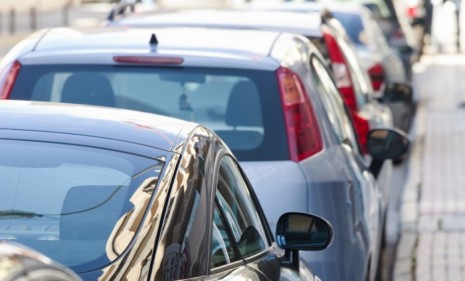The high cost of free parking
In most U.S. cities, businesses are forced to provide free parking. Is that the reason Americans drive so much?

A free daily email with the biggest news stories of the day – and the best features from TheWeek.com
You are now subscribed
Your newsletter sign-up was successful
There's a new enemy in the war on traffic and pollution: Free parking. Urban planning professor Donald Shoup, in his book The High Cost of Free Parking, says that charging drivers more for parking would discourage them from making unnecessary trips, says economist Tyler Cowen in The New York Times. City governments have contributed to the problem by requiring new businesses to provide a minimum number of parking spaces, which encourages urban sprawl and makes it harder for people to do anything without getting into their cars. Is it time to rethink free parking?
The math is pretty clear: The argument against mandatory parking spaces is pretty persuasive, says Alexis Madrigal at The Atlantic. Forcing businesses to build a minimum number of spaces has, over the course of decades, pushed cities outward. And that has undeniably driven up "the amount of energy it takes Americans to meet their lives' basic requirements," increasing pollution and wasting gasoline in the bargain.
"How free parking drives Americans to waste energy"
The Week
Escape your echo chamber. Get the facts behind the news, plus analysis from multiple perspectives.

Sign up for The Week's Free Newsletters
From our morning news briefing to a weekly Good News Newsletter, get the best of The Week delivered directly to your inbox.
From our morning news briefing to a weekly Good News Newsletter, get the best of The Week delivered directly to your inbox.
Don't blame local governments: The anti-free-parking warriors have it backwards, says Randal O'Toole at Cato@Liberty. Shopping malls, office parks, and Wal-Mart don't offer acres of free parking because cities force them to — they often provide more parking than ordinances require. That's because Americans do 90 percent of their urban travel by car, so providing parking is good for business. Free parking isn't an environment-crushing way to subsidize unnecessary driving — it's "a free-market choice."
"Free markets for free parking"
Charging for parking isn't necessarily the solution: In New York City, drivers often have a choice, says Elaine Schwartz at EconLife. They can park for free on a side street, or pay for prime, metered spots closer to the stores on busy avenues. No wasted spaces — but drivers end up creating pollution, exacerbating congestion, and making life difficult for pedestrians by driving around "searching for spots." So eliminating excess free parking won't fix everything.
A free daily email with the biggest news stories of the day – and the best features from TheWeek.com
-
 Can Keir Starmer save the Chagos deal?
Can Keir Starmer save the Chagos deal?Today's Big Question Opponents confident they can scupper controversial agreement as PM faces a race against time to get it over the line
-
 China and the rise of the humanoid robots
China and the rise of the humanoid robotsThe Explainer The country’s ‘bustling’ robotics industry is dominating the global market, though experts are split on how concerned we should be
-
 The cabbage comeback
The cabbage comebackThe Week Recommends Gone are the days of ‘WWII boiled cabbage recipes’. The humble vegetable is enjoying a resurgence